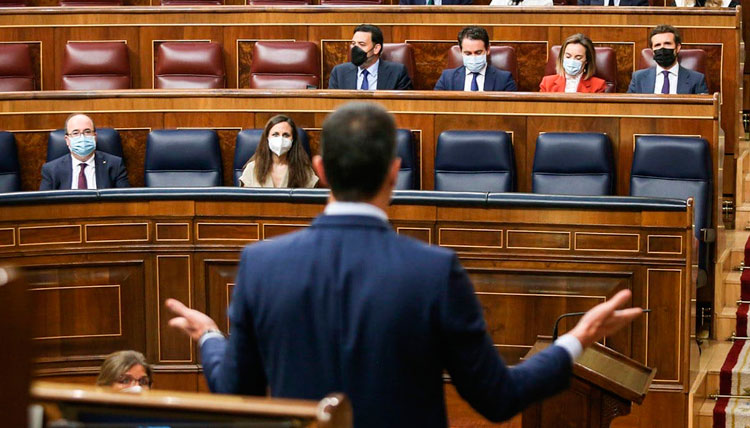The Diplomat
Morocco decided yesterday to reseal the border crossing with Ceuta, after two days of looking the other way as 8,000 migrants crossed illegally into Spanish territory, provoking a serious diplomatic crisis with Spain.
Some 5,600 of these immigrants have already been returned to Morocco, according to the Interior Ministry, but the government has to face the problem of what to do with the 1,500 unaccompanied minors who cannot be returned, if they do not even accept it. Yesterday it negotiated with several autonomous communities that had offered to take in some of them.
Meanwhile, Unidas Podemos, a partner of the government headed by Pedro Sánchez, far from contributing to lowering the tension, added fuel to the fire yesterday, when its secretary for International Affairs and MEP, Idoia Villanueva, called on the government not to give in to Morocco’s “blackmail” and demanded “self-determination for the Sahrawi people”.
However, Pedro Sánchez’s recriminations were directed yesterday in the Congress of Deputies at the leader of the opposition, Pablo Casado, whom he accused of not backing the government when it is suffering a challenge from a third country, Morocco. “I hope that you – he said – abandon this disloyal opposition, not with the Government but with the State, and assume your responsibility as the main opposition party”.
Casado assured that there is more loyalty in the opposition than in the Council of Ministers itself, in allusion to the position of Podemos, and affirmed that the Moroccan attack is “the chronicle of a crisis foretold” in the face of the “diplomatic errors of the Government”, the “loss of external weight and the change of allies”. “It began by breaking the tradition of travelling first to Morocco, it did not react to the occupation of Canary Islands waters or to Trump’s recognition of the Sahara, and it concealed Ghali’s arrival with false documentation,” he said.
After this clash in Parliament, the PP leader later tried to clarify that he considers that the “blame” for the situation lies with the neighbouring country and that the will of his party is to help the government in the face of “any aggression coming from outside”.
Spain once again received the backing of the European Union yesterday, through the mouth of Vice-President Margaritis Schinas, who told the European Parliament that “Europe is in solidarity with Spain; Ceuta is Europe”. He also urged third countries of origin and transit of migrants, without mentioning Morocco, to work together with the EU and not against the EU in this matter.
A spokesperson for the European Commission assured that the Moroccan authorities have committed themselves to controlling the passage of people to Ceuta, in a conversation between the Commissioner for Enlargement and Neighbourhood Policy, Oliver Varhelyi, and the Moroccan Minister of Foreign Affairs, Naser Bourita.
And from the US, Jalina Porter, a State Department spokeswoman, told a press conference: “We support both Spain and Morocco working together toward a resolution.
Relations with the Moroccan authorities remain tense, however, and the government in Rabat continued to accuse Spain of having taken in Polisario Front leader Brahim Ghali in a hospital. The Minister of State for Human Rights and Relations with Parliament, Mustafa Ramid, said Spain “knew that the price for underestimating Morocco is very high”. On his Facebook profile, he wrote. “Spain’s reception of the leader of the Polisario separatist militias, under a false identity, without taking into account good neighbourly relations that require coordination and consultation, or at least taking care to inform Morocco, is an irresponsible and totally unacceptable act.”
The Spanish government has not reacted to Morocco’s recall of its ambassador to Madrid, with a similar measure, so as not to strain relations, and until yesterday afternoon it was not known that there had been any contact at the level of heads of government or foreign ministers.
Speaking to Radio Nacional de España, the head of Spanish diplomacy, Arancha González Laya, indicated that the lines of contact are still open through different channels, but warned that “one does not treat one’s neighbours by not getting on the phone”.
Asked whether Spain is considering activating Felipe VI to play a mediation role, the minister said that “any mission of rapprochement must be discreet in order to be effective”. “The most prudent thing on my part is to remain discreet about what channels can be used to bring positions closer together in this situation”.






